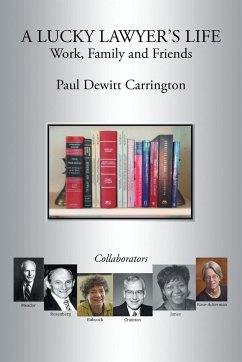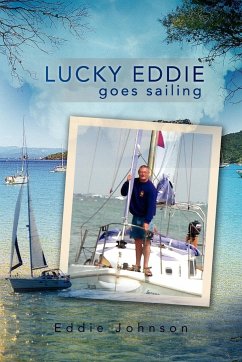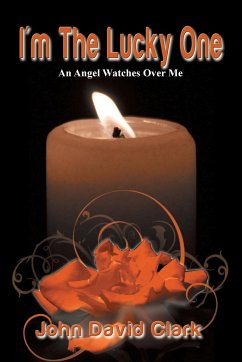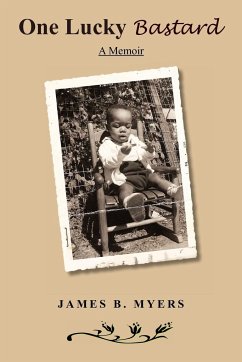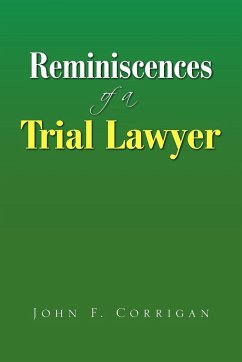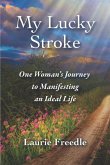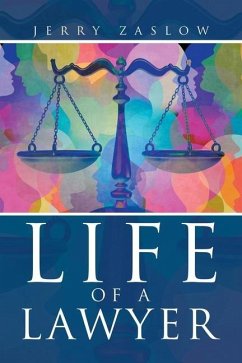Paul Dewitt Carrington
A LUCKY LAWYER'S LIFE
Paul Dewitt Carrington
A LUCKY LAWYER'S LIFE
- Broschiertes Buch
- Merkliste
- Auf die Merkliste
- Bewerten Bewerten
- Teilen
- Produkt teilen
- Produkterinnerung
- Produkterinnerung
This work recounts pleasures that I have enjoyed as a lawyer and shared with my family. I try to explain why and how I became a lawyer; my forebears played a major role in causing that outcome. I then identify many of the legal disputes and political issues in which I have been actively engaged since 1948. I will also recount how my romance with law and my professional good luck connected to an amazing family resulting from more than sixty two years of marriage.
Andere Kunden interessierten sich auch für
![Lucky Eddie Goes Sailing Lucky Eddie Goes Sailing]() Eddie JohnsonLucky Eddie Goes Sailing18,99 €
Eddie JohnsonLucky Eddie Goes Sailing18,99 €![I'm the Lucky One I'm the Lucky One]() John David ClarkI'm the Lucky One21,99 €
John David ClarkI'm the Lucky One21,99 €![One Lucky Bastard One Lucky Bastard]() James B. MyersOne Lucky Bastard18,99 €
James B. MyersOne Lucky Bastard18,99 €![There Is No I in Lucky There Is No I in Lucky]() Jim WaltersThere Is No I in Lucky17,99 €
Jim WaltersThere Is No I in Lucky17,99 €![Reminiscences of a Trial Lawyer Reminiscences of a Trial Lawyer]() John F. CorriganReminiscences of a Trial Lawyer10,99 €
John F. CorriganReminiscences of a Trial Lawyer10,99 €![My Lucky Stroke: One Woman's Journey to Manifesting an Ideal Life My Lucky Stroke: One Woman's Journey to Manifesting an Ideal Life]() Laurie FreedleMy Lucky Stroke: One Woman's Journey to Manifesting an Ideal Life15,99 €
Laurie FreedleMy Lucky Stroke: One Woman's Journey to Manifesting an Ideal Life15,99 €![Life of a Lawyer Life of a Lawyer]() Jerry ZaslowLife of a Lawyer16,99 €
Jerry ZaslowLife of a Lawyer16,99 €-
-
-
This work recounts pleasures that I have enjoyed as a lawyer and shared with my family. I try to explain why and how I became a lawyer; my forebears played a major role in causing that outcome. I then identify many of the legal disputes and political issues in which I have been actively engaged since 1948. I will also recount how my romance with law and my professional good luck connected to an amazing family resulting from more than sixty two years of marriage.
Hinweis: Dieser Artikel kann nur an eine deutsche Lieferadresse ausgeliefert werden.
Hinweis: Dieser Artikel kann nur an eine deutsche Lieferadresse ausgeliefert werden.
Produktdetails
- Produktdetails
- Verlag: Xlibris
- Seitenzahl: 386
- Erscheinungstermin: 22. September 2016
- Englisch
- Abmessung: 229mm x 152mm x 23mm
- Gewicht: 625g
- ISBN-13: 9781514486337
- ISBN-10: 1514486334
- Artikelnr.: 53122198
- Herstellerkennzeichnung
- Libri GmbH
- Europaallee 1
- 36244 Bad Hersfeld
- gpsr@libri.de
- Verlag: Xlibris
- Seitenzahl: 386
- Erscheinungstermin: 22. September 2016
- Englisch
- Abmessung: 229mm x 152mm x 23mm
- Gewicht: 625g
- ISBN-13: 9781514486337
- ISBN-10: 1514486334
- Artikelnr.: 53122198
- Herstellerkennzeichnung
- Libri GmbH
- Europaallee 1
- 36244 Bad Hersfeld
- gpsr@libri.de
Paul D. Carrington is a recently retired professor of law and former dean (1978-1988) at Duke University. He is a native of Dallas, a graduate of the University of Texas (1952) and Harvard Law School (1955). After serving a tour in the army, he commenced teaching law and has continued that career since 1957. He has been a member of the law faculties at Wyoming, Indiana, Ohio State, Michigan, and Duke. He has held visiting appointments at ten other American law schools and has taught in five foreign universities. He has given occasional lectures at over a hundred other law schools in the United States and abroad. He is the author or editor of nine books and numerous symposia and is the author of more than one hundred leading articles in academic legal journals. His work has been supported by the Ford, Guggenheim, Luce, and Rockefeller foundations. His writings have ranged across many legal and law-related topics, including civil procedure, legal education, contracts, criminal law, constitutional law, comparative law, and the history of the legal profession. Recent books are Stewards of Democracy (Harper Collins, 1999); Spreading America's Word (Twelve Tables Press, 2005); Reforming the Supreme Court: Term Limits for Justices (edited with Roger C. Cramton, Carolina 2006); Law and Class in America: Trends Since the Cold War (edited with Trina Jones, NYU, 2006); American Lawyers: Public Servants and the Development of a Nation (ABA, 2012) Anti-Corruption Policy (edited with Susan Rose-Ackerman, Carolina, 2013). As an active member of the legal profession, he has served many diverse causes of law reform. He initiated efforts to secure enactment of the Uniform Commercial Code in Wyoming. It was enacted in that state in 1960, one of the earliest enactments of that legislation that has since become the law of every state. While teaching, he has represented numerous individual clients pro bono publico in support of their claims to civil liberties. In 1967-1969, he directed the American Bar Foundation study of the United States Courts of Appeal. In 1969-1971, he directed a study of legal education for the Association of American Law Schools funded by the Ford Foundation. In 1970-1973, he served as an elected trustee of the Ann Arbor Board of Education. In 1970-1975, he served the Federal Judicial Center as vice chair of the Advisory Council on Appellate Justice, organizing the 1975 national conference on that subject. In 1976-1978, he directed a program of law reform for the Supreme Court of Michigan. From 1978 to 1988, he was dean of the Duke Law School. From 1985 to 1992, he served as reporter to the Advisory Committee on Civil Rules of the Judicial Conference of the United States. In 1997-1999, he directed a program on judicial independence and accountability for the American Bar Association, organizing a national conference on that subject in 1999. He helped organize the group in North Carolina that brokered enactment of a statute in 2001 providing for public finance of judicial campaigns, a scheme replicated in New Mexico, West Virginia, and Wisconsin and now invalidated by the Supreme Court. He also organized the group that drafted the Model Fair Bargain Act enacted in New Mexico in 2000 and supported for enactment in other states by diverse groups favoring protection of individuals from predatory business practices. He was, in 2000-2006, a member of the panel on law and science of the National Academy of Science. In 2000, he lobbied successfully for the National Automobile Dealers to secure Congressional relief from mandatory arbitration clauses in their contracts with manufacturers and, in 2008, for farmers securing similar relief from clauses in their contracts with firms processing their produce. He is an elected member of the American Law Institute, an elected fellow of the American Bar Foundation and of the American Academy of Arts & Sciences, and an honorary fellow of the American Academy of Appellate Lawyers. His interest in international matters was first manifested in 1970 when he visited Colombian law schools at the request of the Ford Foundation. As a law dean, he was, in 1981, a leader in opening American law schools to students from China and, in the summer of 1985, taught at Jilin University in Changchun. He has since taught at the University of Tokyo and Doshisha University in Kyoto and at Albert-Ludwigs-Universitat Freiburg and Bucerius Law School in Hamburg. He is an elected member of the International Association on Procedural Law and has actively served on its programs, most recently in 2010. In 1995, he was a resident fellow at the Bellagio Center and, in 2002, at the American Academy in Berlin. He has also served clients in international matters. In 1986-1988, he devoted substantial effort to organize legal representation of Filipino sugar growers victimized by the corruption of the Marcos regime. In 2004, he served as a consultant to lawyers representing Bangladesh farmers whose lands were destroyed by an explosion of a gas well being drilled by a Texas firm; the aim was to provide an American forum for the farmers who would not be heard in a Bangladesh forum because of the prevailing corruption. Retained in 2007 as an expert, he presented to an arbitration panel of the International Chamber of Commerce an assessment of the corruption of the government of Equatorial Guinea. Since 1985, he has presented to many audiences the merits and demerits of American dependence on private enforcement of public law. He is, in 2013, actively advocating the use of that method to enforce international law and national laws enacted to deter transnational corrupt practices and has published several essays on the subject. He is also actively engaged in the politics of judicial administration in North Carolina, the legalization of marijuana, the reform of legal education to address the problem of excessive tuition accompanied by declining salaries for graduates, and the defense of public schools.

